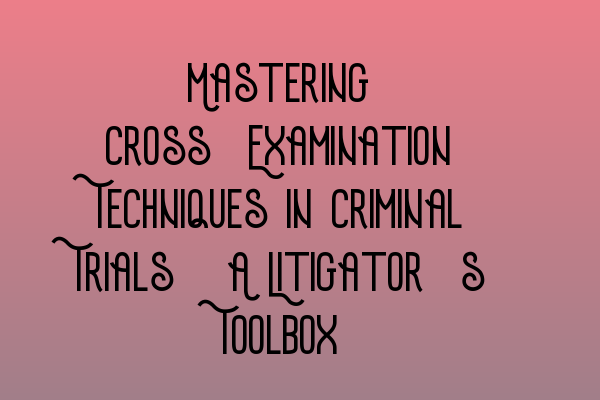Mastering Cross-Examination Techniques in Criminal Trials: A Litigator’s Toolbox
Welcome to SQE Criminal Law & Practice Law UK, where we specialize in providing expert legal advice and insights. In this blog post, we will explore the art of cross-examination and delve into the essential techniques every litigator should master. Cross-examination is a critical skill that can make or break a criminal trial, and being well-versed in its intricacies will significantly enhance your effectiveness as a lawyer.
1. Preparation: The Key to Success
In order to master cross-examination techniques, thorough preparation is essential. The solicitors at SQE Criminal Law & Practice Law UK understand the importance of meticulous groundwork before stepping into the courtroom. Investing time in analyzing case documents, interviewing witnesses, and conducting thorough research will lay the foundation for a successful cross-examination.
For a comprehensive guide on how to demystify the solicitors qualifying examination format, check out our related article: Demystifying the Solicitors Qualifying Examination Format.
2. Establishing Credibility: The Power of Effective Questions
When conducting cross-examinations, skillfully crafted questions are crucial for establishing credibility and exposing any weaknesses or inconsistencies in the witness’s testimony. By using leading questions, lawyers can guide the testimony and highlight key points beneficial to their client’s case.
To learn more about LLC formation and how to navigate the process, read our step-by-step guide for UK entrepreneurs: LLC Formation Made Simple: Step-by-Step Guide for UK Entrepreneurs.
3. Active Listening: Uncovering the Truth
An often overlooked aspect of effective cross-examination is the art of active listening. By attentively listening to the witness’s answers, litigators can identify inconsistencies or contradictions that can be used to challenge the witness’s credibility. This skill requires patience and the ability to think quickly on your feet.
To gain a comprehensive understanding of LLC formation and its step-by-step process, refer to our article: LLC Formation: A Step-by-Step Guide for UK Entrepreneurs.
4. Impeachment: Unveiling the Truth
Impeachment is a powerful tool in cross-examination, allowing litigators to challenge the witness’s credibility or the accuracy of their testimony. By introducing prior inconsistent statements, past convictions, or other forms of impeachment evidence, lawyers can effectively unravel the witness’s credibility and reveal the truth.
To navigate the complex landscape of business regulations in the UK, consult our comprehensive overview: Business Regulations in the UK: A Comprehensive Overview.
5. Ethics and Professionalism: Upholding Legal Standards
While cross-examination can be an intense and adversarial process, it is crucial to always prioritize ethics and professionalism. Upholding legal standards is essential for maintaining credibility and ensuring a fair trial. As lawyers, we have a responsibility to adhere to ethical considerations and conduct ourselves with utmost professionalism.
To delve deeper into the ethical considerations in UK law and learn how to uphold professional standards, read our informative article: Ethical Considerations in UK Law: Upholding Professional Standards.
Mastering cross-examination techniques is an ongoing process that requires dedication, experience, and a deep understanding of the law. As solicitors at SQE Criminal Law & Practice Law UK, we strive to equip our lawyers with the necessary tools and knowledge to excel in the courtroom. By effectively utilizing cross-examination techniques, you can present a compelling case that safeguards the interests of your clients.
For more insights into criminal law and practice in the UK, stay tuned to our blog and keep exploring the resources provided by SQE Criminal Law & Practice Law UK.
